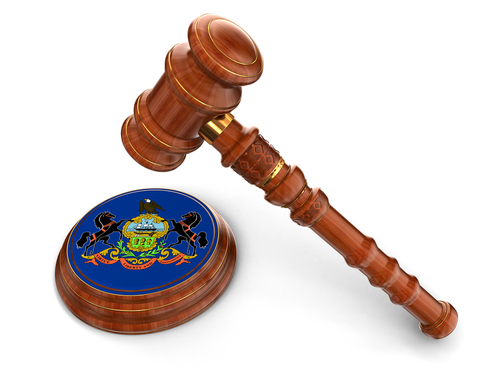Federal appeals court tosses lawyer's challenge to anti-bias ethics rule

The 3rd U.S. Circuit Court of Appeals at Philadelphia has tossed a lawsuit filed by a Pennsylvania lawyer, who contended that a state ethics rule violated the First Amendment and was unconstitutionally vague. Image from Shutterstock.
A Pennsylvania lawyer does not have standing to challenge a state ethics rule banning discrimination and harassment in the practice of law, a federal appeals court has ruled.
In an Aug. 29 opinion, the 3rd U.S. Circuit Court of Appeals at Philadelphia tossed the lawsuit filed by lawyer Zachary Greenberg of Pennsylvania, who contended that the rule violated the First Amendment and was unconstitutionally vague.
Greenberg had feared that his continuing legal education presentations could be interpreted as harassment or discrimination under the ethics rule. Greenberg’s CLE seminars quoted offensive language from judicial opinions and discussed arguably controversial topics.
But the challenged rule—Rule 8.4(g) of the Pennsylvania Rules of Professional Conduct—does not generally prevent Greenberg from quoting offensive words or expressing controversial opinions, the 3rd Circuit said.
The appeals court also cited a declaration from the chief disciplinary counsel of the Pennsylvania Supreme Court’s disciplinary board, who said Greenberg’s planned speeches and writings did not violate the ethics rule.
The chief disciplinary counsel interpreted the rule as encompassing only conduct that targets harassment or discrimination against “an identifiable person.” The official does not interpret Rule 8.4(g) as banning general discussions of caselaw or controversial opinions.
Greenberg had challenged Pennsylvania’s first version of the ethics rule in an August 2020 suit. Pennsylvania then changed the ethics rule, prompting an amended complaint from Greenberg.
The new rule states that it is professional misconduct for a lawyer to, in the practice of law, knowingly engage in conduct constituting harassment or discrimination based on race, sex, gender identity or expression, religion, national origin, ethnicity, disability, age, sexual orientation, marital status or socioeconomic status.
A commentary to the rule defines “harassment” as “conduct that is intended to intimidate, denigrate or show hostility or aversion toward a person.”
The appeals court said the rule “covers only knowing or intentional harassment or discrimination against a person. Nothing in Greenberg’s planned speeches comes close to meeting this standard.”
The appeals court also said the rule “reaches only lawyers who are practically certain their speech will cause harassment or discrimination, not those who inadvertently offend their audience.”
If Greenberg’s fears prove to be true, he can bring a new challenge to the ethics rule, the 3rd Circuit said.
A federal judge had issued a preliminary injunction preventing the rule from taking effect.
The rule is Pennsylvania’s version of Rule 8.4(g) of the ABA Model Rules of Professional Conduct. The Pennsylvania rule is based on, but not identical to, the ABA rule, according to an ABA amicus brief filed in September 2022 in the case.
The amicus brief argued that the Pennsylvania ethics rule was constitutional and should be upheld, according to a September 2022 ABA press release.
Judge Anthony Joseph Scirica wrote the panel opinion. Judge Thomas L. Ambro said in a concurrence the Pennsylvania rule could be amended preemptively to address alleged constitutional concerns before an attorney with standing challenges the rule.
Ambro suggested looking to more narrow rules enacted by Maine, New Hampshire, New York and Connecticut. The New York anti-bias rule, for example, says lawyers may “express views on matters of public concern in the context of teaching, public speeches, continuing legal education programs or other forms of public advocacy or education or in any other form of written or oral speech protected by the United States Constitution or the New York State Constitution,” according to the New York Law Journal.
The 3rd Circuit case is Greenberg v. Lehocky.
Law.com and Reuters are among the publications with coverage of the decision.
Hat tip to Bloomberg Law.
See also:
“The ABA needs ideological diversity to ensure its future”
Write a letter to the editor, share a story tip or update, or report an error.


